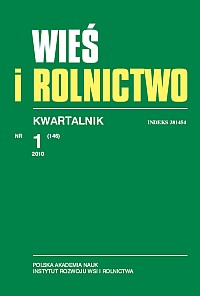Pozycja prawna gminy wiejskiej w procedurze wyznaczania i ochrony obszarów Natura 2000
Legal Position of Rural Communes in the Procedure of Delimitation and Protection of the Natura 2000 Areas
Author(s): Adam HabudaSubject(s): Law, Constitution, Jurisprudence
Published by: Instytut Rozwoju Wsi i Rolnictwa Polskiej Akademii Nauk
Keywords: commune; rural commune; executive organ; chief officer of commune’s villages; Natura 2000 area; planning instruments; decision instruments; opinion; decision on environmental determinants; undertaking; protection of the natural environment; competencies
Summary/Abstract: The aim of the paper is to present the legal status of a rural commune in the process of formation and protection of a Natura 2000 area. The paper is divided into four parts. The first part deals with the place of environmental protection in the activity of public authorities, especially of local councils. The second part of the paper presents arguments in favour of distinguishing a rural commune from among other types of communes which in legal terms form a fairly uniform category. The third part deals with the legal essence of the Natura 2000 areas and characterises the processes of their formation. The fourth part of the paper describes legal instruments that can be used by communes in dealing with the issue of Natura 2000 areas. The participation of communes in the creation of Natura 2000 areas is based on planning and advisory instruments. As far as the protection of the already established areas is concerned decision instruments connected with the implementation of definite undertakings play the key role. The executive organ of a commune can participate in this process at the preliminary stage when environmental determinants of a given undertaking are being discussed but it also can be the author of a decision indispensable to implement a definite project. It can also happen that the executive organ of a commune will take no part in the issue of any of the earlier described decisions despite the fact that a project is to be implemented on the territory of that commune. Such situation leads to the question about the position of the executive organ – does it have the legal status of a party? The paper does not cover all aspects of the problem for its aim is to accomplish some sort of systematisation, to introduce some order and to show the problem in a broader perspective.
Journal: Wieś i Rolnictwo
- Issue Year: 146/2010
- Issue No: 1
- Page Range: 80-92
- Page Count: 13
- Language: Polish

